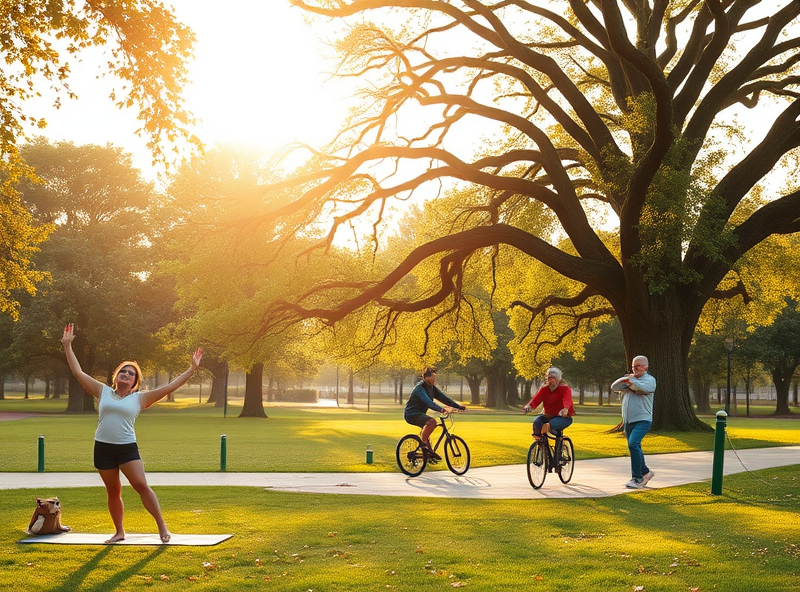
Exercise and Immunity: Boosting Your Defense the Healthy Way
How Moderate Exercise Activates Immune Cells

Did you know that a brisk walk or a light jog can do more than just lift your mood? Moderate exercise plays a powerful role in strengthening your immune system — and it all starts with your immune cells. When you engage in moderate physical activity, your body experiences a temporary increase in circulation. This helps immune cells like natural killer cells, T cells, and macrophages move more freely throughout your body. These cells are your body’s first line of defense, identifying and destroying harmful pathogens before they can cause illness.
What’s even more amazing is that regular moderate exercise trains your immune system to respond more efficiently. It reduces inflammation, supports the production of anti-inflammatory cytokines, and helps your body manage stress hormones like cortisol — all of which can suppress immune function if left unchecked. Unlike intense or prolonged workouts that may temporarily weaken immunity, moderate activity boosts your defenses in a sustainable and healthy way.
So next time you lace up your sneakers for a 30-minute walk, remember: you’re not just exercising your muscles — you’re empowering your immune system. A little movement goes a long way toward keeping you healthy and resilient.
Stress Relief and Inflammation Control Through Movement

In today’s fast-paced world, stress can feel like an unavoidable part of life. But did you know that regular physical activity is one of the most effective and natural ways to manage stress and reduce inflammation in the body? Movement isn’t just about burning calories — it’s a powerful tool for emotional and physical well-being.
When you engage in moderate exercise like walking, yoga, swimming, or cycling, your body releases endorphins — those feel-good chemicals that help improve your mood and reduce feelings of anxiety. At the same time, physical activity helps regulate cortisol, the stress hormone, keeping it in balance and preventing it from causing long-term damage to your body.
Chronic stress is known to contribute to inflammation, which is linked to a variety of health issues including heart disease, diabetes, and autoimmune conditions. Exercise helps by reducing pro-inflammatory markers in the body and enhancing the production of anti-inflammatory cytokines. In simple terms, movement helps your body calm down on a cellular level.
The key is consistency and moderation. You don’t need to run marathons or spend hours at the gym. Just 30 minutes of gentle movement most days of the week can make a big difference. Try incorporating mindful movement like tai chi or stretching into your routine — not only will it help you feel more relaxed, but it will also support your immune system in the long run.
So next time you’re feeling overwhelmed, take a deep breath and go for a walk. Your body and mind will thank you.
The J-Curve: Finding the Right Intensity for Immunity

Did you know that the way you exercise can actually influence your immune system—for better or worse? It’s true! This is where the concept of the ‘J-Curve’ comes in. Imagine a graph shaped like the letter ‘J’. On the left side, you have sedentary behavior, which is linked to a higher risk of illness. In the middle, you have moderate exercise, which strengthens your immune defenses. But on the far right, intense and prolonged exercise without proper recovery can actually suppress your immune system, increasing your risk of getting sick.
So, what does this mean for your daily routine? It means that moderate, consistent physical activity—like brisk walking, cycling, or light jogging for 30–60 minutes most days of the week—can enhance your immune response. It helps your body circulate immune cells more efficiently, reduces inflammation, and lowers stress hormones like cortisol.
However, pushing yourself too hard with intense workouts, especially without enough rest, can have the opposite effect. Your body may release more stress hormones, and your immune cells might become less effective temporarily. This is why athletes often become more susceptible to colds or infections after heavy training or competition.
The key takeaway? Balance is everything. Listen to your body, aim for regular moderate activity, and don’t forget the importance of rest and recovery. Your immune system will thank you!
Tips: Balanced Workouts, Rest, and Nutrition

Taking care of your immune system doesn’t have to be complicated. In fact, the key lies in creating a balanced lifestyle that supports your body’s natural defenses. Let’s explore how you can strengthen your immunity through thoughtful exercise, proper rest, and smart nutrition choices.
1. Balanced Workouts: Exercise is a powerful tool for boosting immunity, but moderation is key. Aim for 30 to 60 minutes of moderate activity most days of the week—think brisk walking, cycling, swimming, or yoga. Overtraining can actually weaken your immune system, so listen to your body and mix in rest days.
2. Prioritize Rest and Recovery: Sleep is when your body repairs and regenerates. Adults should aim for 7–9 hours of quality sleep each night. Don’t underestimate the power of rest days between workouts either—your immune system needs time to recharge just like your muscles do.
3. Nourish with Purpose: A well-balanced diet rich in fruits, vegetables, lean proteins, and healthy fats provides the nutrients your immune system needs to function optimally. Focus on foods high in vitamins C and D, zinc, and antioxidants. Stay hydrated and try to limit processed foods and added sugars, which can suppress immune function.
Remember, consistency is more important than intensity. By maintaining a balanced routine of exercise, rest, and nutrition, you’re not just supporting your immune system—you’re building a healthier, more resilient you. 🌿








답글 남기기